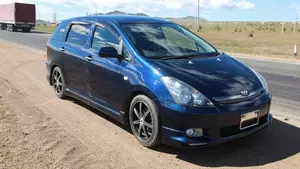
| Vehicle | Curb weight | Difference from world's smallest | Weight to power ratio | 0—60 mph acceleration ratio | Consumption ratio |
|---|---|---|---|---|---|
| 2.0i |
1430 kg / 3153 lbs |
1005 kg (2216 lbs) heavier | 9 kg to 1 hp | - |
207 kg/L (456 lbs/L) |
| 1.8i |
1450 kg / 3197 lbs |
1025 kg (2260 lbs) heavier | 11 kg to 1 hp | - |
210 kg/L (463 lbs/L) |
| Vehicle | 2.0i |
|---|---|
| Curb weight |
1430 kg / 3153 lbs |
| Difference from world's smallest | 1005 kg (1005 lbs) heavier |
| Weight to power ratio | 9 kg to 1 hp |
| 0—60 mph acceleration ratio | - |
| Consumption ratio |
207 kg/L (456 lbs/L) |
| Vehicle | 1.8i |
| Curb weight |
1450 kg / 3197 lbs |
| Difference from world's smallest | 1025 kg (1025 lbs) heavier |
| Weight to power ratio | 11 kg to 1 hp |
| 0—60 mph acceleration ratio | - |
| Consumption ratio |
210 kg/L (463 lbs/L) |

| Vehicle | Curb weight | Difference from world's smallest | Weight to power ratio | 0—60 mph acceleration ratio | Consumption ratio |
|---|---|---|---|---|---|
| 2.0i |
1380 kg / 3043 lbs |
955 kg (2106 lbs) heavier | 9 kg to 1 hp | - |
209 kg/L (461 lbs/L) |
| 1.8i |
1440 kg / 3175 lbs |
1015 kg (2238 lbs) heavier | 11 kg to 1 hp | - |
218 kg/L (481 lbs/L) |
| Vehicle | 2.0i |
|---|---|
| Curb weight |
1380 kg / 3043 lbs |
| Difference from world's smallest | 955 kg (955 lbs) heavier |
| Weight to power ratio | 9 kg to 1 hp |
| 0—60 mph acceleration ratio | - |
| Consumption ratio |
209 kg/L (461 lbs/L) |
| Vehicle | 1.8i |
| Curb weight |
1440 kg / 3175 lbs |
| Difference from world's smallest | 1015 kg (1015 lbs) heavier |
| Weight to power ratio | 11 kg to 1 hp |
| 0—60 mph acceleration ratio | - |
| Consumption ratio |
218 kg/L (481 lbs/L) |

| Vehicle | Curb weight | Difference from world's smallest | Weight to power ratio | 0—60 mph acceleration ratio | Consumption ratio |
|---|---|---|---|---|---|
| 2.0 |
1360 kg / 2999 lbs |
935 kg (2062 lbs) heavier | 9 kg to 1 hp | - |
197 kg/L (434 lbs/L) |
| 1.8 |
1400 kg / 3087 lbs |
975 kg (2150 lbs) heavier | 11 kg to 1 hp | - |
179 kg/L (395 lbs/L) |
| Vehicle | 2.0 |
|---|---|
| Curb weight |
1360 kg / 2999 lbs |
| Difference from world's smallest | 935 kg (935 lbs) heavier |
| Weight to power ratio | 9 kg to 1 hp |
| 0—60 mph acceleration ratio | - |
| Consumption ratio |
197 kg/L (434 lbs/L) |
| Vehicle | 1.8 |
| Curb weight |
1400 kg / 3087 lbs |
| Difference from world's smallest | 975 kg (975 lbs) heavier |
| Weight to power ratio | 11 kg to 1 hp |
| 0—60 mph acceleration ratio | - |
| Consumption ratio |
179 kg/L (395 lbs/L) |

| Vehicle | Curb weight | Difference from world's smallest | Weight to power ratio | 0—60 mph acceleration ratio | Consumption ratio |
|---|---|---|---|---|---|
| 1.8 |
1400 kg / 3087 lbs |
975 kg (2150 lbs) heavier | 11 kg to 1 hp | - |
179 kg/L (395 lbs/L) |
| 2.0 |
1360 kg / 2999 lbs |
935 kg (2062 lbs) heavier | 9 kg to 1 hp | - |
197 kg/L (434 lbs/L) |
| Vehicle | 1.8 |
|---|---|
| Curb weight |
1400 kg / 3087 lbs |
| Difference from world's smallest | 975 kg (975 lbs) heavier |
| Weight to power ratio | 11 kg to 1 hp |
| 0—60 mph acceleration ratio | - |
| Consumption ratio |
179 kg/L (395 lbs/L) |
| Vehicle | 2.0 |
| Curb weight |
1360 kg / 2999 lbs |
| Difference from world's smallest | 935 kg (935 lbs) heavier |
| Weight to power ratio | 9 kg to 1 hp |
| 0—60 mph acceleration ratio | - |
| Consumption ratio |
197 kg/L (434 lbs/L) |